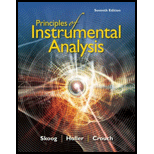
Principles of Instrumental Analysis
7th Edition
ISBN: 9781305577213
Author: Douglas A. Skoog, F. James Holler, Stanley R. Crouch
Publisher: Cengage Learning
expand_more
expand_more
format_list_bulleted
Question
thumb_up100%
Chapter 26, Problem 26.14QAP
Interpretation Introduction
(a)
Interpretation:
Number of plates from each plate should be calculated.
Concept introduction:
Number of theoretical plates given by following equation;
N = number of plates
tR = retention time
W = width of peak base
Interpretation Introduction
(b)
Interpretation:
Mean and standard deviation for the N should be calculated.
Concept introduction:
Mean =
Standard deviation will give how the values deviate from mean value of N.
Interpretation Introduction
(c)
Interpretation:
Plate height of the column should be determined.
Concept introduction:
N = plate count
L = length of the packing (cm)
H = height of the column
Expert Solution & Answer
Trending nowThis is a popular solution!

Students have asked these similar questions
Don't use ai to answer I will report you answer
Provide the correct common name for the compound shown here.
Ph
heat
heat
Chapter 26 Solutions
Principles of Instrumental Analysis
Ch. 26 - Prob. 26.1QAPCh. 26 - Prob. 26.2QAPCh. 26 - Prob. 26.3QAPCh. 26 - Prob. 26.4QAPCh. 26 - Prob. 26.5QAPCh. 26 - Prob. 26.6QAPCh. 26 - Prob. 26.7QAPCh. 26 - Prob. 26.8QAPCh. 26 - Prob. 26.9QAPCh. 26 - Prob. 26.10QAP
Ch. 26 - Prob. 26.11QAPCh. 26 - Prob. 26.12QAPCh. 26 - Prob. 26.13QAPCh. 26 - Prob. 26.14QAPCh. 26 - Prob. 26.15QAPCh. 26 - Prob. 26.16QAPCh. 26 - From the data in Problem 26-14, calculate for...Ch. 26 - Prob. 26.18QAPCh. 26 - Prob. 26.19QAPCh. 26 - Prob. 26.20QAPCh. 26 - Prob. 26.21QAPCh. 26 - Prob. 26.22QAPCh. 26 - Prob. 26.23QAP
Knowledge Booster
Similar questions
- (12) Which one of the following statements about fluo- rometry is FALSE? a) Fluorescence is better detected at 90 from the exci- tation direction. b) Fluorescence is typically shifted to longer wave- length from the excitation wavelength. c) For most fluorescent compounds, radiation is pro- duced by a transitionarrow_forwardDon't used Ai solutionarrow_forwardDon't used Ai solutionarrow_forward
- Don't used Ai solutionarrow_forwardIndicate the correct option.a) Graphite conducts electricity, being an isotropic materialb) Graphite is not a conductor of electricityc) Both are falsearrow_forward(f) SO: Best Lewis Structure 3 e group geometry:_ shape/molecular geometry:, (g) CF2CF2 Best Lewis Structure polarity: e group arrangement:_ shape/molecular geometry: (h) (NH4)2SO4 Best Lewis Structure polarity: e group arrangement: shape/molecular geometry: polarity: Sketch (with angles): Sketch (with angles): Sketch (with angles):arrow_forward
- 1. Problem Set 3b Chem 141 For each of the following compounds draw the BEST Lewis Structure then sketch the molecule (showing bond angles). Identify (i) electron group geometry (ii) shape around EACH central atom (iii) whether the molecule is polar or non-polar (iv) (a) SeF4 Best Lewis Structure e group arrangement:_ shape/molecular geometry: polarity: (b) AsOBr3 Best Lewis Structure e group arrangement:_ shape/molecular geometry: polarity: Sketch (with angles): Sketch (with angles):arrow_forward(c) SOCI Best Lewis Structure 2 e group arrangement: shape/molecular geometry:_ (d) PCls Best Lewis Structure polarity: e group geometry:_ shape/molecular geometry:_ (e) Ba(BrO2): Best Lewis Structure polarity: e group arrangement: shape/molecular geometry: polarity: Sketch (with angles): Sketch (with angles): Sketch (with angles):arrow_forwardDon't used Ai solutionarrow_forward
arrow_back_ios
SEE MORE QUESTIONS
arrow_forward_ios
Recommended textbooks for you
 Principles of Instrumental AnalysisChemistryISBN:9781305577213Author:Douglas A. Skoog, F. James Holler, Stanley R. CrouchPublisher:Cengage Learning
Principles of Instrumental AnalysisChemistryISBN:9781305577213Author:Douglas A. Skoog, F. James Holler, Stanley R. CrouchPublisher:Cengage Learning Macroscale and Microscale Organic ExperimentsChemistryISBN:9781305577190Author:Kenneth L. Williamson, Katherine M. MastersPublisher:Brooks Cole
Macroscale and Microscale Organic ExperimentsChemistryISBN:9781305577190Author:Kenneth L. Williamson, Katherine M. MastersPublisher:Brooks Cole

Principles of Instrumental Analysis
Chemistry
ISBN:9781305577213
Author:Douglas A. Skoog, F. James Holler, Stanley R. Crouch
Publisher:Cengage Learning



Macroscale and Microscale Organic Experiments
Chemistry
ISBN:9781305577190
Author:Kenneth L. Williamson, Katherine M. Masters
Publisher:Brooks Cole